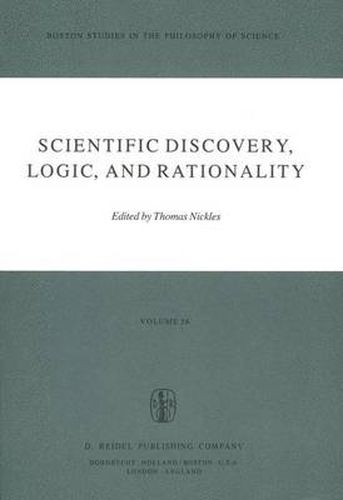Readings Newsletter
Become a Readings Member to make your shopping experience even easier.
Sign in or sign up for free!
You’re not far away from qualifying for FREE standard shipping within Australia
You’ve qualified for FREE standard shipping within Australia
The cart is loading…






This title is printed to order. This book may have been self-published. If so, we cannot guarantee the quality of the content. In the main most books will have gone through the editing process however some may not. We therefore suggest that you be aware of this before ordering this book. If in doubt check either the author or publisher’s details as we are unable to accept any returns unless they are faulty. Please contact us if you have any questions.
It is fast becoming a cliche that scientific discovery is being rediscovered. For two philosophical generations (that of the Founders and that of the Followers of the logical positivist and logical empiricist movements), discovery had been consigned to the domain of the intractable, the ineffable, the inscrutable. The philosophy of science was focused on the so-called context of justification as its proper domain. More recently, as the exclusivity of the logical reconstruc tion program in philosophy of science came under question, and as the critique of justification developed within the framework of logical and epistemological analysis, the old question of scientific discovery, which had been put on the back burner, began to emerge once again. Emphasis on the relation of the history of science to the philosophy of science, and attention to the question of theory change and theory replacement, also served to legitimate a new concern with the origins of scientific change to be found within discovery and invention. How welcome then to see what a wide range of issues and what a broad representation of philosophers and historians of science have been brought together in the present two volumes of the Boston Studies in the Philosophy of Science! For what these volumes achieve, in effect, is the continuation of a tradition which had once been strong in the philosophy of science - namely, that tradition which addressed the question of scientific discovery as a central question in the understanding of science.
$9.00 standard shipping within Australia
FREE standard shipping within Australia for orders over $100.00
Express & International shipping calculated at checkout
This title is printed to order. This book may have been self-published. If so, we cannot guarantee the quality of the content. In the main most books will have gone through the editing process however some may not. We therefore suggest that you be aware of this before ordering this book. If in doubt check either the author or publisher’s details as we are unable to accept any returns unless they are faulty. Please contact us if you have any questions.
It is fast becoming a cliche that scientific discovery is being rediscovered. For two philosophical generations (that of the Founders and that of the Followers of the logical positivist and logical empiricist movements), discovery had been consigned to the domain of the intractable, the ineffable, the inscrutable. The philosophy of science was focused on the so-called context of justification as its proper domain. More recently, as the exclusivity of the logical reconstruc tion program in philosophy of science came under question, and as the critique of justification developed within the framework of logical and epistemological analysis, the old question of scientific discovery, which had been put on the back burner, began to emerge once again. Emphasis on the relation of the history of science to the philosophy of science, and attention to the question of theory change and theory replacement, also served to legitimate a new concern with the origins of scientific change to be found within discovery and invention. How welcome then to see what a wide range of issues and what a broad representation of philosophers and historians of science have been brought together in the present two volumes of the Boston Studies in the Philosophy of Science! For what these volumes achieve, in effect, is the continuation of a tradition which had once been strong in the philosophy of science - namely, that tradition which addressed the question of scientific discovery as a central question in the understanding of science.